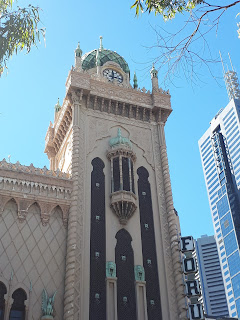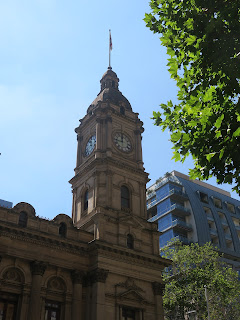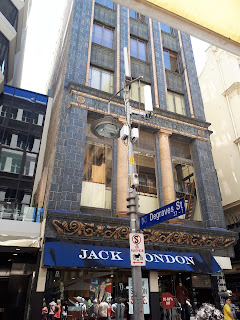
It's not just me. Not just us. Melbourne, for the seventh year in a row, was named most liveable city in the world in 2017. See
here.
We loved the tree-lined downtown streets, the trolleys, the fabled hook turns (well, given we were pedestrians, and our balcony overlooked both a park and a busy right-turn over a trolley tracks intersection which provided loads of entertainment, they were good,) the topography, the parks and botanical gardens, the historic precincts, the river-side walks and cafes. The immense free public spaces of Federation Square. Did I mention the coffee?
 |
| love this style standoff, neither corner backing down |
But even the most jaded visitor would have been swayed by our two guides, the day we joined a free three-hour walking tour of the CBD. Their local knowledge, their enthusiasm, their friendliness and easy patter - and their Melbourne boosting - made being herded around the streets with two dozen 30-something tourists, a delight. Here are some walking tour
guides should you be motivated into some arm chair travelling yourself.
 |
| from Victorian pomp... |
 |
| ...to laneway street art |
 |
| the Yarra, which once had a waterfall |
We followed the admonition of the
old city website to "look up past the awnings" (for sadly, many of the jazzy store-fronts were unsympathetic, if downright inimical, to the c19 facades rising above them. Invariably, parked cars added nothing good.)
Melbourne became known as Marvellous Melbourne during the booming days of the gold rush in Ballarat and places north. By the 1880s Melbourne was larger than most European capital cities, with turrets, towers, domes and spires rivalling the best of them. Within a decade the whole thing crashed, banks and stockbrokers lost their nerve, many suffered great hardship.
 |
| Melbourne Town Hall 1867 |
 |
| Majorca Building - Moorish glazed terracotta |
 |
| State Library est. 1854 |
 |
| Princess' Theatre (1886) |
Here's a neat little
website offered by Museum Victoria, which places the short-lived gold boom into the city's history. Limited to a few short years, the elation waned, but the over-the top structures built by boosterish Victorians stand to tell us their stories.
Precincts full of stone structures with their Colonial confidence, spreading lawns and gracious shade trees. Heaven.
There's a bookful of them - the National Trust Guide
Walking Melbourne. This is a sample entry on the Princess Theatre. I'm dying to get my hands on this
book somehow.
 |
| City Court (1911) intimidating with Romanesque gloom |
The Old Magistrate's Court (built after Federation, in 1911, and now part of RMIT) keeps the Colonial spirit alive, conjuring ancient British legal tradition with its sternly forbidding Romanesque style. Bush ranger Ned Kelly was sentenced to death here, after a fabled career Robin Hooding around Victoria.
 |
| Royal Exhibition Building - 1880 - UNESCO World Heritage Site |
The Royal Exhibition Building was built in 1880 in the era of Great Exhibitions (think Crystal Palace, the 1893 World's Columbian Exposition in
Chicago.) Melbourne's palace to progress has the distinction of being the oldest survivor of the Great Exhibition Era still operating as an exhibition hall. (When it's not been standing in as an examination hall for generations of nervous students.) It stands in the wonderful Carleton Gardens.
Here's a useful Melbourne city planning web
site. Okay I can't think of anyone besides me who might use it, but don't want to lose track of it, so I'll store it here.
 |
| Block Arcade(1891-93) - shopping for splendour |


The Block Arcade means different thing to different people. Billed as "the place to shop and be seen" it is also "one of the finest examples of a nineteenth century shopping arcade on the planet." (link) If chocolatiers, an historic tea-room or high end shops don't appeal, stay for the marble mosaic floors, stone carving, and glass domes. Jaw-dropping beautiful.

If you should wish to enter the fray into which this laneway leads, here's a
portal thanks to Streetview. In my on the fly photo you'll see a nod to Melbourne's noted street art, one of the ubiquitous invitations to coffee, and a peek at Moorish 1929 Forum Theatre (formerly The State Theatre) facing off with Federation Square across Flinders Street. Melbourne in one.
I've discovered a lot of great sites while researching this post. Raaer99 is a prolific photographer of Melbourne (and nearby Ballarat) buildings. Here's his
Flickr photostream.
And should you not agree with my selection of favourites, here's Culturetrip's 'most impressive' list for
reference.
And who knows, maybe I'll go back one day to discover a new list of favourites?
 It's not just me. Not just us. Melbourne, for the seventh year in a row, was named most liveable city in the world in 2017. See here.
It's not just me. Not just us. Melbourne, for the seventh year in a row, was named most liveable city in the world in 2017. See here.
















So lovely to be reminded of the architectural joys of Melbourne! Thank you.
ReplyDelete